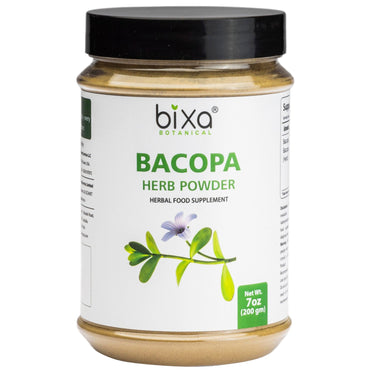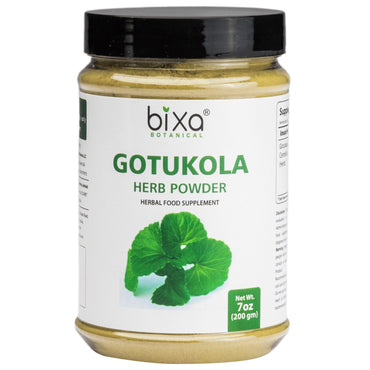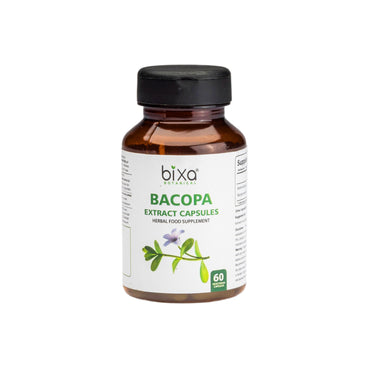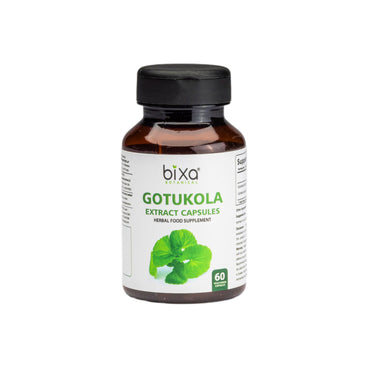
$26.99 USD
Supports healthy brain & mental functions It Contains Triterpinoids which Supports in neurological problems Promotes more blood flow to brain & high intelligence level Supports development of tissues of Vocal Chords (Voice quality).\ Bacoside present, supports preventive degenerative changes in Brain cells. Brahmi, Nir-brahmi Or Bacopa is a perennial, creeping herb native to the wetlands of southern and Eastern India, Australia, Europe, Africa, Asia, and North and South America. Bacopa is a medicinal herb used in Ayurveda, where it is also known as ""Brahmi"", after Brahmā, the creator God of the Hindu pantheon. Bacopa monnieri was initially described around the 6th century A.D. in texts such as the Charaka Samhita, Atharva-Veda, and Susrut Samhita as a medhya rasayana (Brain Rejuvenator)–class herb taken to sharpen intellect and attenuate mental deficits. The herb was allegedly used by ancient Vedic scholars to memorize lengthy sacred hymns and scriptures.From Ancient time Brahmi/ Bacopa is...
Supports healthy brain & mental functions It Contains Triterpinoids which Supports in neurological problems Promotes more blood flow to brain...
$26.99 USD
Supports Healthy Brain function Supports as sensory organ tonic especially for speech disability Contains Tri-terpenes helpful to improve overall health and longevity Saponins helps to improve fluid circulation & prevent Joint inflammation. Centella asiatica (Botanical Name) is also known as Brahma-manduki, Mandukaparni in Sanskrit and nowadays it is commonly known as Gotu Kola. For medicinal purpose the leaves of the plant or whole plant is also used. Mandukaparni or Gotu kola is a soft herb found all over India near marshy areas up to 600 meters. Its leaves have shape and appearance like a webbed feet of frog (In Sanskrit Mandook means frog, and Parni means leaf). Ayurveda mentions Gotu kola uses as Brahmi Herb (Bacopa) especially helps for treating brain disorders, skin diseases, neural disorders and insomnia due to its adaptogen property, central nervous system relaxant, sedative, detoxifier, blood-purifier, laxative, diuretic, emmenagogue properties. Ayurveda mentions that regular intake of...
Supports Healthy Brain function Supports as sensory organ tonic especially for speech disability Contains Tri-terpenes helpful to improve overall health...
$14.99 USD
Supports healthy brain & mental functions It Contains Triterpinoids which helps in neurological problems. It helps to flow more blood to brain & increasing intelligence. It helps to develop tissues of Vocal Chords (Voice quality). Lab tested for quality, Non-GMO, vegan & gluten free Brahmi Or Bacopa is a perennial, creeping herb native to the wetlands of southern and Eastern India, Australia, Europe, Africa, Asia, and North and South America. Bacopa is a medicinal herb used in Ayurveda, where it is also known as "Brahmi", after Brahmā, the creator God of the Hindu pantheon. Bacopa monnieri was initially described around the 6th century A.D. in texts such as the Charaka Samhita, Atharva-Veda, and Susrut Samhita as a medhya rasayana (Brain Rejuvenator)–class herb taken to sharpen intellect and attenuate mental deficits. The herb was allegedly used by ancient Vedic scholars to memorize lengthy sacred hymns and scriptures. From Ancient time Brahmi/ Bacopa is used as Nervine and...
Supports healthy brain & mental functions It Contains Triterpinoids which helps in neurological problems. It helps to flow more blood...
$14.99 USD
Supports Healthy Brain function Supports as sensory organ tonic especially for speech disability. Contains Tri-terpenes helpful to improve overall health and longevity. Saponins helps to improve fluid circulation & prevent Joint inflammation. Lab tested for quality, Non-GMO, vegan & gluten free Centella asiatica (Botanical Name) is also known as Brahma-manduki, Mandukaparni in Sanskrit and nowadays it is commonly known as Gotu Kola. For medicinal purpose the leaves of the plant or whole plant is also used. Mandukaparni or Gotu kola is a soft herb found all over India near marshy areas up to 600 meters. Its leaves have shape and appearance like a webbed feet of frog (In Sanskrit Mandook means frog, and Parni means leaf). Ayurveda mentions Gotu kola uses as Brahmi Herb (Bacopa) especially helps for treating brain disorders, skin diseases, neural disorders and insomnia due to its adaptogen property, central nervous system relaxant, sedative, detoxifier, blood-purifier, laxative,...
Supports Healthy Brain function Supports as sensory organ tonic especially for speech disability. Contains Tri-terpenes helpful to improve overall health...
-
Previous
- Page 1 of 1
-
Next
Description
BRAIN WELLNESS:
Our brain is an incredible and pure three-pound organ that controls all features of the body, interprets info from the external world, and embodies the essence of the thoughts and soul. Take our natural organic Brain tablets to maintain Your mind Intelligence, creativity, emotion, and memory are some of the things handled by the mind. Protected within the cranium(The cranium is made from 8 bones that fuse collectively along with suture lines.), the brain consists of the cerebrum, cerebellum, and brainstem.The mind receives info by means of our 5 senses: sight, smell, touch, taste and hearing – a lot of times to many at one time. It assembles the messages in a way that makes sense to us, and retains the information in our memory. The brain controls our ideas, thoughts and speech, motion of the legs and arms, and the motion of many organs inside our body. The central nervous system (CNS) consists of the brain and spinal cord. The peripheral nervous system (PNS) consists of spinal nerves that branch out from the spinal cord and cranial nerves that emerge from the brain.
The brain is composed of the cerebrum, cerebellum, and brainstem.
Cerebrum: is the biggest part of the brain consisting of right and left hemispheres. It performs advanced functions such as deciphering touch, vision and hearing, in addition to speech, reasoning, emotions, learning and control of movement.
Cerebellum: is positioned underneath the cerebrum. Its function is to coordinate muscle actions, maintain posture, and balance.
Brainstem: functions as a relay center connecting the cerebrum and cerebellum to the spinal cord. It performs many involuntary functions such as breathing, heart rate, body temperature, wake and sleep cycles, digestion, sneezing, coughing, vomiting, and swallowing.
Right brain – Left brain
The cerebrum is divided into two: the right and left hemispheres. They are joined by a collection of fibers called the corpus callosum that passes messages from one side to the other. Each hemisphere controls the opposite side of the body. If a stroke occurs on the right side of the brain, your left arm or leg will get weak or paralyzed. Not all functions of the hemispheres are shared. In general, the left hemisphere controls speech, comprehension, arithmetic, and writing. The right hemisphere controls creativity, spatial ability, artistic, and musical skills. The left hemisphere is stronger in hand use and language in about 92% of people.
The cerebral hemispheres have distinct fissures, which divide the brain into lobes. Each hemisphere has 4 lobes: frontal, temporal, parietal, and occipital. Each lobe may be further divided, into areas that serve very specific functions. It’s important to understand that each lobe of the brain does not function by itself. There are very complex connections between the lobes of the brain and between the right and left hemispheres. In general, the left hemisphere of the brain is responsible for language and speech and is called the "dominant" hemisphere. The right hemisphere plays a huge part in interpreting visual information and spatial processing.
In about one third of people who are left-handed, speech function are located on the right side of the brain. Left-handed people may need special testing to determine if their speech center is on the left or right side prior to any surgery in that area.
The surface of the cerebrum is called the cortex. It has a folds like hills and valleys. The cortex contains 16 billion neurons (the cerebellum has 70 billion = 86 billion total) that are present in specific layers. The nerve cell bodies color the cortex grey-brown giving it its name – gray matter. Under the cortex are long nerve fibers (axons) that connect brain areas to each other — called white matter.
Memory is a complex process that includes three phases: encoding (deciding what information is important), storing, and recalling. Different areas of the brain participate in different types of memory. Your brain has to pay attention and rehearse in order for an event to move from short-term to long-term memory – called encoding.
Short-term memory, also called working memory, occurs in the prefrontal cortex. It harbours information for about one minute and its capacity is limited to about 7 items. For example, it enables you to dial a phone number someone just told you. It also gets into action during reading, to help memorize the sentence you have just read, so that the next one makes sense.
Long-term memory is processed in the hippocampus of the temporal lobe and gets activated when you want to store it in your memory for a longer time. This memory has unlimited content and duration capacity. It contains personal memories as well as facts and figures. Skill memory is processed in the cerebellum, which transmits information to the basal ganglia. It stores voluntarily learned memories like tying a shoe, playing an instrument, or riding a bike.
Here is the short list of steps you can take to enhance your brain health, which will lead you to good physical health.
-Make a commitment to exercise regularly: According to an article in the Harvard Health Letter, exercise helps the brain by reducing insulin resistance, reducing inflammation, and triggering the release of growth factors, the chemicals in the brain that affect the health of brain cells, the growth of new blood vessels in the brain, and even the survival of new brain cells. Exercise also lowers stress and improves mental state and sleep. Problems in these areas frequently contribute to poor health.
-Eat natural food: Excessive consumption of the refined fats, sugar, and chemicals in fast food shoots up insulin levels. Subjecting the brain to a significant amount of insulin can lead it to stop responding to it, restricting our ability to think, make correct choices, and create new memories. Unprocessed foods that are rich in micro nutrients and essential fats such as blueberries, broccoli, avocado, kale, , walnuts, salmon and eggs all support brain health.
-Take the required supplements: When you are unable to get all the nutrients you need from food, supplements can prove to be a lifesaver. Support your brain’s health with B vitamins, calcium, magnesium, Vitamin D, fish oil and zinc.
-Indulge in Me-Time: It’s important to meditate regularly, get regular massage, smile often and play, and pursue a hobby for self-development, happiness and free time.
FAQ's
Q. What are Herbal powders?
The useful part of Herbs or medicinal plant is selected, dried, powdered & sieved to 40 or 60 mesh. They can be easily stored and transported.
Q. How effective are Herbal Powders?
They are very effective and fast acting if taken as recommended for particular illness and in correct dosage, as suggested by health practitioner. The result may be seen within 5-7 days.
Q. What is the Shelf life of Herbal Powders?
Generally dried powdered herbs if stored properly never get spoiled or damaged. They may be less effective after 5 years of manufacturing.
Q. What are the importance of Herbal medicines?
Herbal medicines are derived from Natural, Pure Herbs with Natural origin. They work as per their content of natural, pure Bio-active substances (Glucosides), which are not chemicals and not artificially induced! Hence no side-effects of Herbal Medicines, if taken in recommended dosage and for specific illness, Like – Brahmi (Bacopa) Powder very good for Brain Wellness.
Q. Can you make tea from powdered herbs?
Teas can be made by pouring 1 cup of boiling water over 1–2 teaspoons of dried herbs. Cover and let tea steep for 5 minutes or so (roots and bark take longer). Then filter or decant the upper Tea solution and drink.
Q. How you can say, Your Brain Functions are good?
If you can perform your routine daily activity without much difficulties, if your presence of mind is good, if you can remember your and close ones mobile numbers, anniversary dates etc., if you can perform essential physical activities properly, then you can say that your Brain functions are good!
Q. How can judge that your Brain is not working properly?
If you cannot get up or walk properly, if you have sudden imbalance, giddiness, loss of sensations in all/one of the 5 sense organs, memory loss, tremors in hands/legs, weakness in muscles – are the signs that you should go for Brain Check!
Q. How to Boost your Brain wellness?
Perform regular physical & brain exercises, eat healthy and nutritious foods at regular time, have healthy supplements rich in Vitamin B 12 (on advice of health practitioner), avoid sugary, chemical leaded processed foods, sleep at regular time for minimum 6-7 hours in a day, have a Me-Time, dedicated to self - development, enjoyment, fun-frolic.
Q. Herbs good for Brain Wellness?
Brahmi (Bacopa), Gotukola, Holy basil, Indian Gooseberry, Walnut, Almonds.





